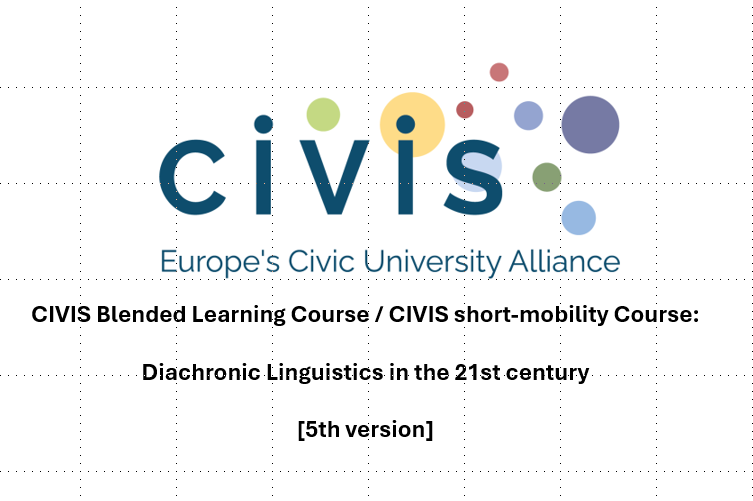· Nikolaos Lavidas is Associate Professor of Diachronic Linguistics at the National and Kapodistrian University of Athens (Department of Language-Linguistics, Faculty of English, School of Philosophy). His research covers a range of topics associated with Indo-European historical linguistics and the directions of language change (in particular the development of transitivity and voice in Indo-European languages), syntax-semantics interface, (historical) language contact and historical corpora.
· Antonio R. Revuelta Puigdollers is Associate Professor of Ancient and Modern Greek at the Universidad Autónoma de Madrid and a sworn translator of Modern Greek. His main research areas are the semantics, syntax and pragmatics of Greek; his work also includes incursions into other languages such as Latin. He is the co-author of a new syntax of Ancient Greek and has authored several entries in Brill’s Encyclopaedia of Ancient Greek Language and Linguistics.
· Katrin Axel-Tober is Professor of German Linguistics at the University of Tübingen, Germany. Her research focuses on the synchronic and diachronic syntax of German. She has published the books Studies on Old High German Syntax: Left Sentence Periphery, Verb Placement and Verb-Second (Benjamins, 2007) and (Nicht-)kanonische Nebensätze im Deutschen: Synchrone und diachrone Aspekte (Walter de Gruyter, 2012) as well as several articles on sentence structure, complementizers, null subjects, and modal verbs.
· Artemij Keidan is Associate Professor of Linguistics at the Italian Institute of Oriental Studies, Sapienza Università di Roma. His main areas of expertise include the history of grammatical thought, Indo-European morphology, philosophy of language, and issues in syntax and phonology, both general and applied to ancient (such as Sanskrit, Latin, Gothic, Slavic languages) and modern languages.
· Flavia Pompeo is Associate Professor of Historical and General Linguistics at the Department of Letters and modern Cultures (Dipartimento di Lettere e Culture moderne), Sapienza Università di Roma. Her research interests focus on historical linguistics, historical sociolinguistics and cognitive linguistics, and, in particular, on topics regarding the morphosyntax and semantics of Ancient Greek and Old Iranian.
· Joanna Kopaczyk is Professor in Scots and English (English Language & Linguistics) at the University of Glasgow. She is a historical linguist with a special interest in the medieval and early modern history of the Scots language. She uses corpus-driven methods to uncover textual standardisation and she is also interested in formulaicity in language, as revealed through all kinds of repetitive patterns. She has recently co-edited books on Applications of Pattern-Driven Methods in Corpus Linguistics (John Benjamins, 2018) and on Binomials in the History of English (Cambridge University Press, 2017).
· Adina Dragomirescu is Associate Professor of Linguistics at the University of Bucharest (Department of Linguistics, Faculty of Letters) and Senior Researcher at (as well as and head of) the “Iorgu Iordan – Al. Rosetti” Institute of Linguistics (Romanian Academy). Her main research areas are Romanian and Romance Syntax, historical syntax, and language contact. She wrote two single-authored books (on unaccusative verbs in Romanian, and on the Romanian supine), and she contributed to collective works such as: The Oxford History of Romanian Morphology (2021), The Oxford Guide to the Romance Languages (2016), The Cambridge Handbook of Romance Linguistics (2022), The [Oxford] Grammar of Romanian (2013), The [Oxford] Syntax of old Romanian (2016).
· Alexandru Nicolae is Associate Professor of Linguistics at the University of Bucharest (Department of Linguistics, Faculty of Letters) and Researcher at the “Iorgu Iordan – Al. Rosetti” Institute of Linguistics (Romanian Academy). His research focuses on comparative and diachronic linguistics, and covers a range of topics associated with Romanian, the Romance languages and the Balkan Sprachbund (e.g., grammaticalization, language contact, word order, definiteness, cliticization, genitives, etc.). Nicolae contributed to reference works like The Oxford Guide to the Romance Languages (2016), The Cambridge Handbook of Romance Linguistics (2022), The [Oxford] Grammar of Romanian (2013), The [Oxford] Syntax of old Romanian (2016), and published three single-authored monographs, two of which are devoted to word order change and other diachronic phenomena in Romanian.
· Ljuba Veselinova is a Professor of Linguistics at Stockholm University, Sweden. Her main interests lie in linguistic typology, the shaping of grammar and lexicon via processes of grammaticalization and lexicalization, numerical concepts and their linguistic expressions, and cyclical processes in language change. She has done extensive work on exceptions to morphological patterns, e.g. suppletion, on negation, specifically, its lexical encoding and independence as a functional domain and also on the evolution of negation and lexical restructuring as a cyclical process. Another prominent direction in her research is language as a geographical phenomenon and the use of Geographical Information Systems for language studies and linguistic cartography. She is also interested in language documentation and description and the use of technology in these domains. She has contributed to projects such as the World Atlas of Language Structures (2005), ed, M. Haspelmath, M. Dryer, D. Gil, B. Comrie, Oxford University Press, and likewise the online edition, https://wals.info (2013), EMELD and LL-Map. As an MA student in the US, she was the first student editor of the LINGUIST List.
· Matthias Heinz: Dean - Kulturwissenschaftlichen Fakultät - Paris Lodron University of Salzburg. Scholar in Romance philology and linguistics, research experience in the fields of lexicology and lexicography, language contact, phonological/prosodic and grammatical typology of the Romance languages, historical linguistics; research, publications and teaching encompassing Italian, French and Spanish linguistics.
· Diana Lewis is Associate Professor of English Linguistics at Aix-Marseille Université and researcher at the Laboratoire Parole et Langage. Her research takes a functional, usage-based approach to the study of language change and is corpus-based. It focuses on semantic and morphosyntactic change in Modern English, particularly at the borders of syntax and discourse (adverbials, parentheticals, connectors), and on patterns of coherence relations in discourse and their effects, including contrastive studies of English and Romance languages. She is co-editor (with K. Aijmer) of Contrastive Analysis of Discourse-pragmatic Aspects of Linguistic Genres (Springer 2017) and a member of the editorial board of Languages in Contrast (John Benjamins).

